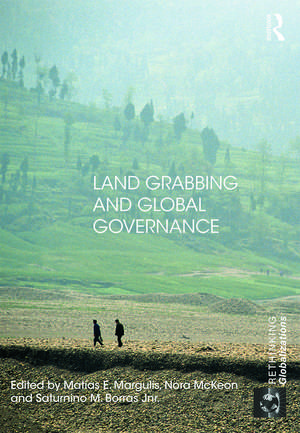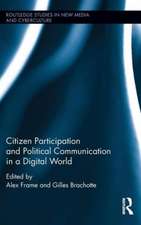Land Grabbing and Global Governance: Rethinking Globalizations
Editat de Matias E. Margulis, Nora McKeon, Saturnino Borras Jr.en Limba Engleză Paperback – 20 sep 2013
Land grabbing is facilitated by ever greater flows of capital, goods, and ideas across borders, and these flows occur through axes of power that are far more polycentric than the North-South imperialist tradition. Land grabs occur in the context of changes in the character of the global food regime, formerly anchored by North Atlantic empires; the integrated food-energy complex seems to be headed towards multiple centres of power, especially with the rise of the BRICS and the proliferation of middle income countries participating in many of the land transactions.
Land Grabbing and Global Governance offers insights from leading scholars and experts on contemporary land grabs. This volume examines land grabs in direct relation to a global economy undergoing profound change and the role of new configurations of actors and power in governance institutions and practices.
This book was published as a special issue of Globalizations.
Din seria Rethinking Globalizations
-
 Preț: 326.74 lei
Preț: 326.74 lei -
 Preț: 311.06 lei
Preț: 311.06 lei -
 Preț: 280.55 lei
Preț: 280.55 lei -
 Preț: 311.41 lei
Preț: 311.41 lei - 9%
 Preț: 940.58 lei
Preț: 940.58 lei - 9%
 Preț: 970.26 lei
Preț: 970.26 lei -
 Preț: 409.13 lei
Preț: 409.13 lei - 18%
 Preț: 1002.95 lei
Preț: 1002.95 lei - 17%
 Preț: 270.20 lei
Preț: 270.20 lei -
 Preț: 492.53 lei
Preț: 492.53 lei - 18%
 Preț: 1058.43 lei
Preț: 1058.43 lei -
 Preț: 411.42 lei
Preț: 411.42 lei - 18%
 Preț: 1064.01 lei
Preț: 1064.01 lei -
 Preț: 490.83 lei
Preț: 490.83 lei -
 Preț: 423.33 lei
Preț: 423.33 lei -
 Preț: 380.74 lei
Preț: 380.74 lei -
 Preț: 486.17 lei
Preț: 486.17 lei - 18%
 Preț: 1058.86 lei
Preț: 1058.86 lei - 21%
 Preț: 301.97 lei
Preț: 301.97 lei - 18%
 Preț: 1057.75 lei
Preț: 1057.75 lei - 15%
 Preț: 698.43 lei
Preț: 698.43 lei - 18%
 Preț: 1057.05 lei
Preț: 1057.05 lei - 26%
 Preț: 821.10 lei
Preț: 821.10 lei - 15%
 Preț: 700.58 lei
Preț: 700.58 lei - 18%
 Preț: 1061.93 lei
Preț: 1061.93 lei - 18%
 Preț: 998.77 lei
Preț: 998.77 lei - 18%
 Preț: 1278.08 lei
Preț: 1278.08 lei - 16%
 Preț: 188.28 lei
Preț: 188.28 lei - 15%
 Preț: 435.36 lei
Preț: 435.36 lei -
 Preț: 432.63 lei
Preț: 432.63 lei - 18%
 Preț: 1112.90 lei
Preț: 1112.90 lei -
 Preț: 391.29 lei
Preț: 391.29 lei - 18%
 Preț: 1058.79 lei
Preț: 1058.79 lei - 18%
 Preț: 1061.36 lei
Preț: 1061.36 lei - 26%
 Preț: 848.15 lei
Preț: 848.15 lei - 26%
 Preț: 763.97 lei
Preț: 763.97 lei - 18%
 Preț: 1062.98 lei
Preț: 1062.98 lei -
 Preț: 272.92 lei
Preț: 272.92 lei - 18%
 Preț: 1057.05 lei
Preț: 1057.05 lei -
 Preț: 276.24 lei
Preț: 276.24 lei - 18%
 Preț: 1002.60 lei
Preț: 1002.60 lei
Preț: 426.37 lei
Preț vechi: 501.62 lei
-15% Nou
Puncte Express: 640
Preț estimativ în valută:
81.59€ • 84.67$ • 68.20£
81.59€ • 84.67$ • 68.20£
Carte tipărită la comandă
Livrare economică 15-29 martie
Preluare comenzi: 021 569.72.76
Specificații
ISBN-13: 9780415628341
ISBN-10: 0415628342
Pagini: 232
Dimensiuni: 174 x 246 x 15 mm
Greutate: 0.43 kg
Ediția:New.
Editura: Taylor & Francis
Colecția Routledge
Seria Rethinking Globalizations
Locul publicării:Oxford, United Kingdom
ISBN-10: 0415628342
Pagini: 232
Dimensiuni: 174 x 246 x 15 mm
Greutate: 0.43 kg
Ediția:New.
Editura: Taylor & Francis
Colecția Routledge
Seria Rethinking Globalizations
Locul publicării:Oxford, United Kingdom
Cuprins
1. Land Grabbing and Global Governance: Critical Perspectives Section One: Theorizing Land Grabbing, Globalization and Governance 2. Land Grabs Today: Feeding the Disassembling of National Territory 3. Land Grabbing as Security Mercantilism in International Relations 4. Governing the Global Land Grab: Multipolarity, Ideas, and Complexity in Transnational Governance Section Two: Transnational Actors and Emerging Global Land Governance 5. The Governance of Gulf Agro-Investments 6. ‘One Does Not Sell the Land Upon Which the People Walk’: Land Grabbing, Transnational Rural Social Movements, and Global Governance 7. International Human Rights and Governing Land Grabbing: A View from Global Civil Society 8. Certification Schemes and the Governance of Land: Enforcing Standards or Enabling Scrutiny? 9. The Challenge of Global Governance of Land Grabbing: Changing International Agricultural Context and Competing Political Views and Strategies Section Three: Review of Recent Global Land Governance Instruments 10. The FAO Voluntary Guidelines on the Responsible Governance of Tenure of Land, Fisheries and Forests 11. The Principles of Responsible Agricultural Investment 12. The Minimum Human Rights Principles Applicable to Large-Scale Land Acquisitions or Leases 13. Private Governance and Land Grabbing: The Equator Principles and the Roundtable on Sustainable Biofuels 14. Restrictions to Foreign Acquisitions of Agricultural Land in Argentina and Brazil
Descriere
The new wave of land grabbing that followed the recent global food crisis has prompted considerable debate about its social, environmental and political consequences. This volume theorizes and empirically investigates efforts to govern land grabs at global and regional level.
This book was published as a special issue of Globalizations.
This book was published as a special issue of Globalizations.













